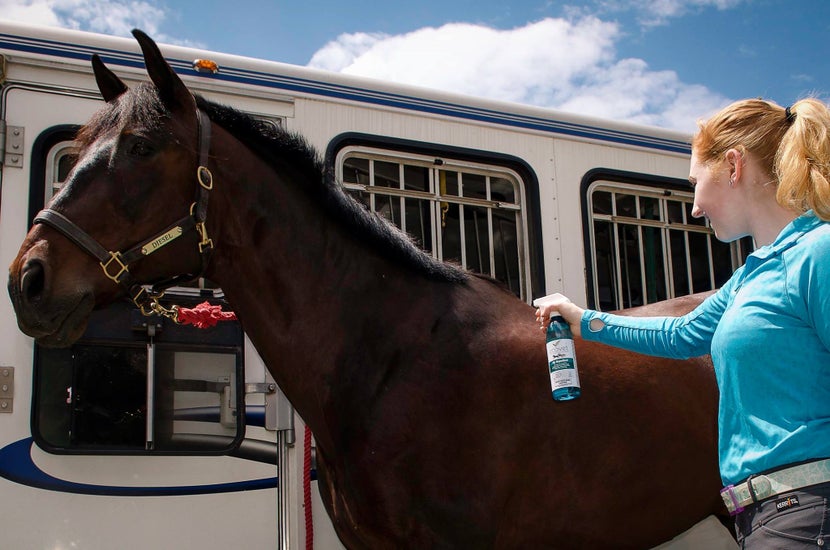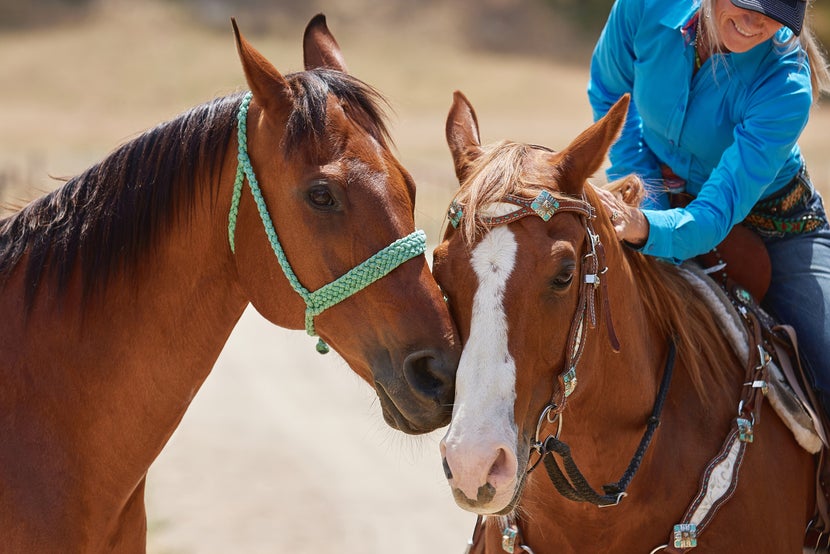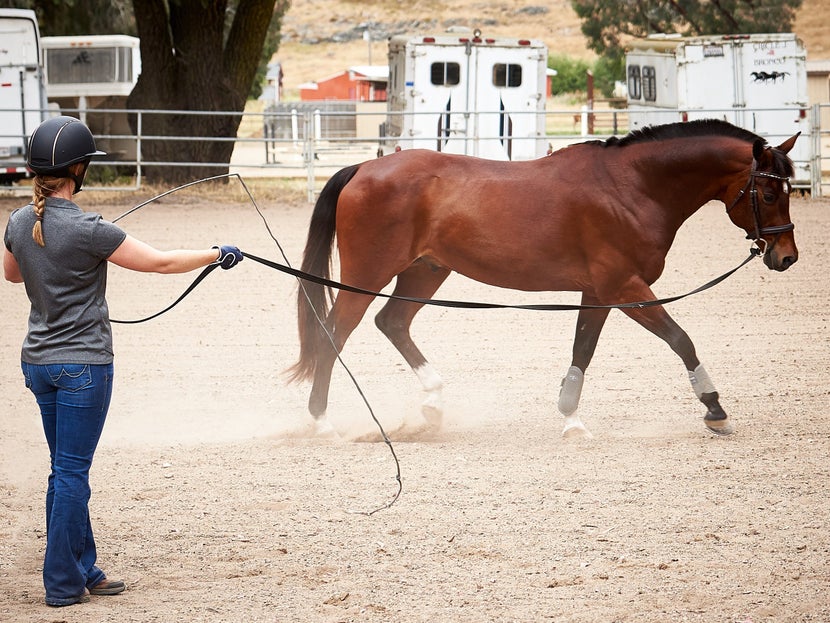How to Help a Nervous Horse
Settle at Shows
Tactics to address nerves in both horses and riders!
Horse shows are exciting, fun, and totally nerve-wracking. For horses and riders alike, being in a new environment and aiming to perform your best in front of a crowd can be scary, leading to anxiety. As riders, we want to have tools in our toolbox to ease that tension should it arise. By keeping ourselves calm, cool, and collected, we can help limit any nervous energy in our horses as well.
In this guide, our crew of equine experts will talk about how nerves tend to present themselves in horses, address a few tools and tactics a rider can use to help settle their horse, and answer some frequently asked questions about nervous horses. It is important to rule out any underlying health problems before tackling the behavioral issue of nervousness. Now, let's dive into ways to help wrangle those nerves!

How Nerves Present Themselves in Horses
All horses present anxiety in different ways, but there are signs that generally mean they are experiencing distress or nerves. Common signs include:
|
|
These signs can tell us that our horse is experiencing stress, and we are likely to see some when traveling away from home, during an appointment with the vet or farrier, when buddy horses get taken away, or even in day-to-day life. Dealing with acute or sudden cases of stress can be hard for riders because they are not used to their horse behaving in such ways. On the other hand, riders with horses who are chronically stressed or nervous in their day-to-day life might already have de-stressing tactics in their toolbox. Regardless of how often you have to deal with stress in your horse, here are some tools for you to try the next time your horse is experiencing nerves!

Tools & Tactics to Help Nervous Horses
Follow a Routine
Horses are creatures of habit and thrive on routines like their daily ride, preparation at shows, and the tack they're used to. For example, if you know your horse does better with a long and leisurely walk warm-up, then you go to a show and immediately start working when you enter the warm-up ring, you are asking for your horse to be more tense and nervous. Similarly, grooming and familiar activities before the ride are great opportunities to maintain a normal and neutral atmosphere for you and your horse.
It's also important to keep your tack constant. It may seem like a no-brainer to refrain from trying new equipment at a show, but it bears repeating. Making major changes can confuse horses and riders alike, plus it can disrupt any flow you might have had going.
Mellow Activities
When everything seems stressful, take a breather! Do some chill activities like hand walking, hacking, grazing, or grooming. Especially when you're somewhere new, taking a moment to see the sights before it's go time is a simple way to boost confidence and decrease nerves.

The Buddy System
Just like it sounds, having buddies around for you and your horse is a reliable and fun way to beat nerves. Since horses are herd animals, seeing others being calm in the same situation encourages them to stay calm too. And if you have more nerves than your horse, friends are a great option for humans as well! Talking to a friend takes your mind away from anxious topics and helps to create a calm rider, which then creates a calm horse!
Arrive Early
Showing up early for a show is a great strategy for numerous reasons:
- Your horse has more time to take in their new surroundings.
- You can set everything up without rushing.
- You can run through your equipment and make any last-minute purchases.
Everyone benefits from extra time when traveling, but this extends to everyday life as well. Try giving yourself some time before a lesson to ensure you have a proper warm-up and a chance to set yourself up for success. Some riders find it works for their horse to eat a snack, such as alfalfa pellets, before their rides to serve as a buffer against stomach acid, which brings us to our next point.

Accounting for Tummy Troubles
There will be stress in the brain if there is any stress in the gut, and if there's stress in the brain, there will likely be stress in the gut. It is important to stay ahead of this cycle. As mentioned previously, giving your horse a snack before activities can sometimes be enough to make the horse comfortable and less anxious. Imagine if you had an upset stomach before running a race and all you needed to do was eat a granola bar. Easy fix! Gastric and digestive supplements can also be of help if your horse needs extra stomach support or is prone to ulcers due to stress.
Calming Supplements
Another route is using calming supplements designed for nerves, such as Perfect Prep. Administering these supplements to your horse is an easy way to get quick and consistent results. Most are designed to be show legal, but always make sure to double-check the ingredient list and your discipline's specific rules to ensure legality.
Let Them Move
In general, a moving horse is a more comfortable horse. At a show, this might mean taking them on as many hand walks as you can, or safely lunging before your ride. Any movement is going to help the horse's brain and body, and will likely benefit you as well. This is especially important if your horse lives somewhere other than a stall at home, since they are used to being able to move around for most of the day. When traveling, a stall is often the only option. Feeling cooped up is hard for anyone, so keep that in mind for your four-legged friends.
Reassuring Contact
Pat. Your. Pony. Horses value having a leader, and if we tell them that they are okay, they are likely to believe us. It might take a lot of patting, but having comforting contact makes a big difference. Similar to contact, deep breathing helps to make us and our horses more relaxed. Being conscious about breathing can release tension in our body and tells the horse that they should also be less tense. This is great to remember during your rides when you might not be able to reach down and give a pat or scratch.
Self-Help
As mentioned in previous sections, helping yourself feel calm and confident will help your horse feel calm and confident. Developing personal strategies for stressful situations is great for riders at shows, at home, or away from the barn. From breathing exercises to personal dance parties, stress relievers are welcomed in any form. Take time to learn about what works for you so you can help your horse! We invite you to try these best stretches for equestrians or exercises for equestrians for both your physical and mental well-being. Invite the chill vibes in!

Frequently Asked Questions
Q: When do horses get nervous?
A: There's no set formula for when horses get nervous. It might be when they travel to a show, when it's windy, or when their barn buddy is separated. Some horses are rarely phased by nerves, so it really comes down to knowing your particular horse. Regardless, it is good to have anti-anxiety tools ready to go since horses are unpredictable!
Q: Does my horse know when I'm nervous?
A: Horses are very keen on our emotions—especially nerves. If we are riding, this is even more heightened as horses can feel our muscles tighten on their back or feel our hands constrict on the reins. Sometimes, the idea of faking your confidence until you actually feel confident is necessary in order to provide our horses with a leader that they can follow when they feel nervous.
Q: How do horses act when they're nervous?
A: Horses tend to show nerves through a combination of these signs: pawing, pacing, cribbing, weaving, teeth grinding, trembling, excessive whinnying, acting out, sweating, and not eating or drinking (or defecating) like normal. Different horses show nerves in different ways, so it is important to understand your horse's normal attitude to be able to tell when something is wrong.
Q: How do I make my horse less nervous?
A: Various solutions exist, but some common tactics include mellow activities like hand walking or grazing, bringing a buddy along, giving your horse extra time to process their surroundings, digestive support, exercise, and reassuring human contact. Working on our confidence around horses also makes us less nervous around them, which in turn helps our equine companions be more confident as well. Maintaining a routine helps make horses more confident at home. Being away from home is often hard for horses, and offering ample food can provide comfort, as well as keeping a travel buddy close by (if possible).
Q: How do I make myself less nervous?
A: Tackling nerves is no joke. Some riders find breathing exercises to be useful while others thrive with activities that force them to focus on something else. If you're at a show, this might be walking a course a billion times until you know it like the back of your hand or personal dance parties in a tack stall. Once you find a de-nerving tactic that works for you, use it to help yourself be a confident leader for your horse!
Closing Thoughts

Whether you're at home or away, stress is always a potential threat. It can lead to a vicious cycle of you and your horse both feeding off of each other's nerves. Finding ways to help your horse stay mellow is just as useful as keeping yourself mellow, so you can reverse the cycle and start to make each other more confident. Just remember that nerves manifest differently for every rider and every horse, and de-stressing tactics are not one size fits all. It is important to know yourself and know your horse, so you can best set yourself up for success. For any further questions, feel free to contact our friendly customer service team by calling 1-800-620-9145 or by emailing info@ridingwarehouse.com. Ride on!




